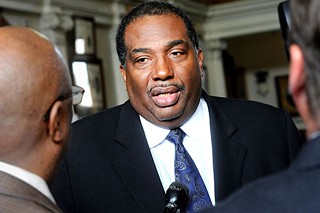Corralling the Evidence
Proposed SB 1439 would tighten statewide evidence procedures
By Jordan Smith, Fri., April 5, 2013
Texas has one of the strongest laws in the nation governing the storage and retention of criminal evidence – but there is no requirement that individuals working with that evidence have any training in how to comply with the law, meaning that handling, packaging, and maintenance of evidence varies wildly across the state. A bill (SB 1439) filed this legislative session by Royce West, D-Dallas, would change that, requiring that evidence technicians be trained and certified, a proposal that has long been a goal of the Texas Association of Property and Evidence Inventory Technicians, says John Vasquez, a former TAPEIT president who now runs a private evidence-control consulting business.
The state has steadily expanded its requirements for retaining evidence that could contain biological materials appropriate for DNA testing, and last session lawmakers passed a bill requiring a group of stakeholders to develop best practices, yet the bill does not require any training for those charged with implementation. "Does that make any sense?" Vasquez asked in an email to the Chronicle. "You have to be certified to be a police dispatcher. You have to be certified to analyze biological and other evidence, but you don't need to be certified to know how to collect, preserve, and store the evidence so its integrity is retained for future testing! That just [doesn't] make any sense to me."
An investigation into the state of criminal evidence storage and retention in Texas published in February in the Chronicle ("Where's Your Evidence?," Feb. 15) reflected that while state laws mandating preservation and maintenance of evidence are among the strongest in the country, there is little consistency in how these laws are actually carried out, including wide disparities in how evidence is packaged and maintained. Some agencies, including the Austin Police Department, already require training and certification for evidence-handling employees, but that's not a statewide policy. Ensuring that employees are as highly trained as possible is an APD priority, says Ed Harris, chief of field support services for APD.
West's bill would also consolidate into one statute all of the various evidence and property handling laws – including how various types of property and evidence are to be destroyed. Currently, those requirements are scattered across different statutes, creating a compliance challenge – especially among a workforce that may or may not have been trained.
The bill has been referred to the Senate Criminal Justice Committee but has not yet been scheduled for a hearing.
Got something to say on the subject? Send a letter to the editor.









